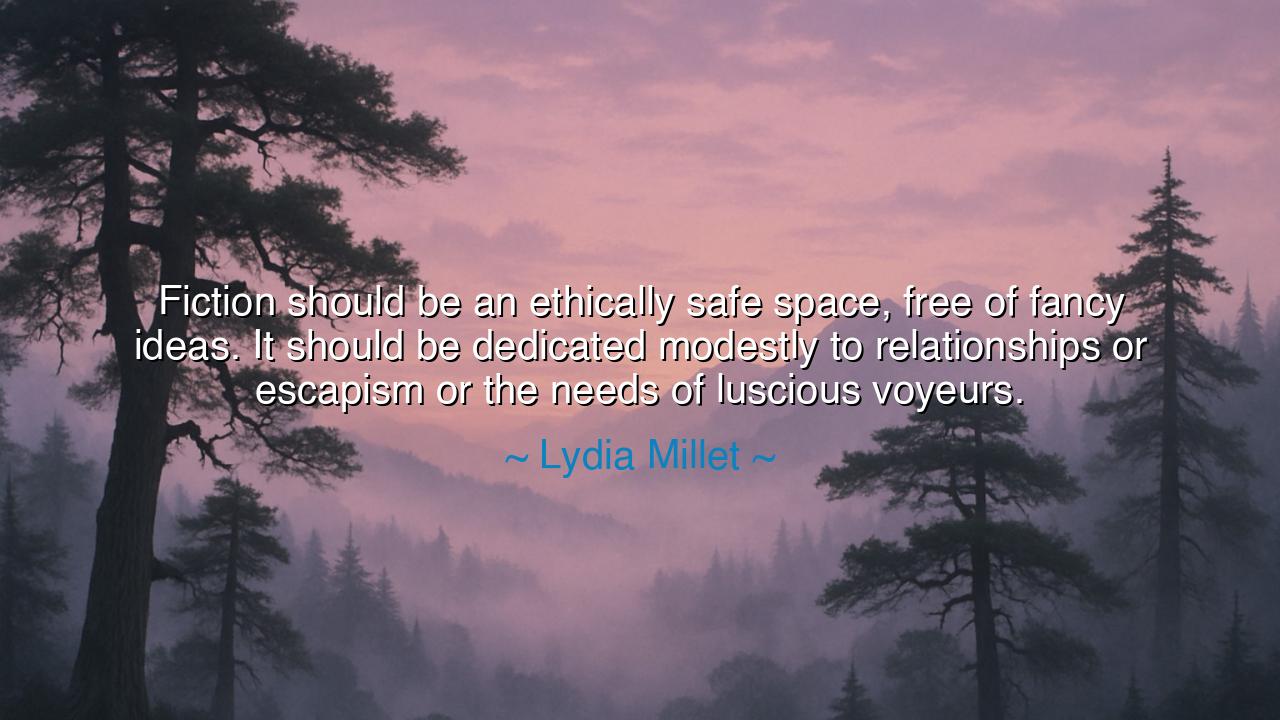
Fiction should be an ethically safe space, free of fancy ideas.
Fiction should be an ethically safe space, free of fancy ideas. It should be dedicated modestly to relationships or escapism or the needs of luscious voyeurs.






Lydia Millet, with irony sharp as a blade and wisdom veiled in jest, declared: “Fiction should be an ethically safe space, free of fancy ideas. It should be dedicated modestly to relationships or escapism or the needs of luscious voyeurs.” At first glance, these words seem a gentle rule for writing, but beneath them lies satire, a rebuke against those who would tame literature, strip it of its daring, and confine it only to what is easy and palatable. Her voice is not one of limitation but of warning, reminding us that the true purpose of fiction is not safety, but danger—danger that awakens, unsettles, and transforms.
The meaning of her words rests in their tension. By saying that fiction should be "an ethically safe space," Millet points to a modern tendency to fear discomfort in art. Some would demand that stories avoid the troubling, the radical, the inconvenient truths of existence. They would have writers focus only on relationships or escapism, on the modest pleasures of sentiment and the indulgences of voyeurism. But Millet’s irony unveils her deeper message: if fiction is reduced to safety, it is robbed of its fire, stripped of its power to challenge and to change.
History has shown us what happens when literature dares more than safety. Think of Dostoevsky, who plumbed the depths of crime, guilt, and redemption. His works were not ethically safe; they dragged readers into the abyss of the human soul, only to reveal, in that abyss, a glimmer of grace. Or consider Mary Shelley, who gave birth to Frankenstein—a tale of creation, hubris, and ruin. It was not escapism but a confrontation with humanity’s desire to play god. These works endure because they were not confined to the comfortable, but risked the raw force of ideas.
And yet, the desire for safety in fiction has often been strong. In many ages, authorities demanded that stories serve morality, teaching only what was deemed proper and virtuous. In the Victorian age, novels were censored, and authors like Hardy and Wilde faced condemnation for daring to depict passion, hypocrisy, or forbidden love. These attempts to tame fiction into “safe space” literature did not preserve virtue—they only revealed fear. It was the brave who defied these rules whose words carried forward into immortality.
Millet’s words, then, may be read as both a satire and a challenge. They force us to ask: should fiction soothe us, or unsettle us? Should it flatter our desires, or expose our illusions? To say it should be "dedicated modestly" is to mock the idea that literature must always behave, always whisper politely, never raise its voice. But the true tradition of literature is not modesty—it is audacity. Fiction has been the prophet’s tongue, the rebel’s banner, the lover’s cry.
The lesson is clear: do not seek only escapism in stories, nor demand only safety. Seek also the dangerous, the provocative, the unsettling. For in discomfort lies growth, in challenge lies awakening. Just as a flame purifies metal, so too does dangerous fiction purify thought. The reader who dares to walk with disturbing ideas may emerge transformed, more aware of the world and of themselves.
Practical action is this: read widely and bravely. Do not fear works that unsettle you; welcome them. Support writers who risk truth, even when it stings. And if you yourself are a creator, do not be bound by the false demand for safety—write with courage, confront with honesty, dare to say what others will not. Remember that fiction is not a cage but a battlefield, not a lullaby but a hymn that shakes the soul.
So let Millet’s words echo, not as instruction but as satire, a warning cloaked in jest: fiction should be safe, modest, escapist. No, it should not. It should be alive, dangerous, and unafraid. For if literature becomes only a refuge for voyeurs, then it ceases to be literature at all. Better a single book that burns the heart than a thousand that soothe it to sleep. And so the task falls to us, readers and writers alike: to protect fiction’s fire, to keep it fierce, and to let it illuminate the dark.






AAdministratorAdministrator
Welcome, honored guests. Please leave a comment, we will respond soon